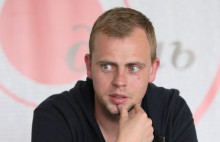Markus Poehlking, German journalist who has been for six years in the profession, came to Ukraine on an exchange program and chose Den from five alternatives. He is not the first intern to come from Germany, the country that has been exchanging journalists most actively. The newspaper has already printed his debut article, titled “Merkel and the Memory of War.” Past year, Markus, together with Den journalist Olesia Yaremchuk, has won the Marion Countess Doenhoff scholarship. This scholarship provides an opportunity for journalists from Eastern Europe to get a two-months internship in a German media; the same quantity of German journalists go for internship in other European countries. And it ignited a spark of an international friendship. Markus has been keen on visiting Ukraine, but he was denied due to security measures, and went for internship in Tbilisi instead. Nevertheless, he has found another exchange program and finally won the chance to reach the country he has long been interested in.
“It was autumn past year, when I first heard of Den from Olesia Yaremchuk. She has brought The Day, Den’s digest in English, to the joint press conference of all the alumnis of the scholarship. I had been interested, and even browsed The Day’s website for articles. The Ukrainian newspaper has enlightened me with a new and interesting knowledge. In Germany, the interest in Ukrainian press has risen, perhaps, only after the Maidan. Only then the people began turning their heads towards Ukraine. I don’t think that prior to that many German journalists have been interested in your context. But I was prepared. I graduated from Ukrainian studies in a University; I have been learning Ukrainian language for three years. I am genuinely interested in your country but, alas, German newspapers have only become interested enough following the elections and further scandals. They pay more attention to geopolitical giants.”
And do the Germans pay much attention to what the Russian media write?
“Yes, because when we speak of what Slavic languages the German journalists know, that’s usually Russian and, to the lesser extent, Polish. Ukrainian is less known. The German idea of the Eastern Europe is that there is Russia, a great country with ancient history. And they know little about Ukraine and its history. But personally, I’m very interested in your history. My friend and I have planned a trip to Ukraine five years ago, but the opportunity for me came only now. As for my friend, he has never been here; he is a doctor now, and has little time for travels.”
And how did you get acquainted with Ukraine?
“I am interested in the Eastern Europe and Ukraine in that context. Maybe Germans do have certain stereotypes about your country. I think that the severity of the Ukrainian-Russian language problem is exaggerated. I have been learning about Ukraine also from various books and films, such as Everything is Illuminated (a film is often criticized for promoting negative stereotypes about Ukraine). I know that you have reasons to be critical of it, but I watched the nature and the landscapes, and liked them very much. It was just at the beginning of my acquaintance with Ukraine. It was the time I was reading Andrii Kurkov, Serhii Zhadan. And now I am reading a book in English from Den’s Library: Ukraine Incognita. TOP 25.”







